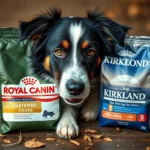
Introduction
Dog nutrition is a vital aspect of pet care that significantly influences a dog’s overall health and well-being. Just like humans, our furry friends require a balanced diet that provides them with the essential nutrients needed to thrive. Proper nutrition not only supports their growth and energy levels but also plays a crucial role in preventing various health issues.
When it comes to dog food ingredients, you’ll often encounter proteins, fats, carbohydrates, vitamins, and minerals. Among these, protein stands out as a key player in a dog’s diet, serving as a building block for muscles and tissues. One of the best protein sources available for dogs is turkey, which has gained immense popularity among pet owners for its nutritional benefits.
Turkey is not just a flavorful option; it’s also a lean protein that offers a range of health benefits for dogs. As a result, many dog food brands have begun to incorporate turkey as a primary ingredient. In this article, we will explore the best turkey dog food options, helping you make informed decisions for your beloved pet.
Understanding Dog Nutrition
Basic Nutritional Needs of Dogs
Dogs require a balanced diet to meet their essential nutritional needs. The primary components of their diet include:
- Proteins: Necessary for tissue repair and muscle development.
- Fats: Provide energy and support skin and coat health.
- Carbohydrates: Serve as a source of energy and aid in digestion.
- Vitamins and Minerals: Essential for maintaining various bodily functions and overall health.
A well-rounded diet ensures that dogs receive the right balance of these nutrients to lead a healthy life.
Role of Proteins in Dog Diet
High-quality proteins are crucial in a dog’s diet. They not only support muscle development but also contribute to healthy skin, coat, and immune function. Turkey, as a protein source, compares favorably to other meats like beef or chicken. It is lower in fat and contains a wealth of essential amino acids, making it an excellent choice for dog food.
Common Dietary Requirements by Dog Size and Breed
Nutritional needs vary based on a dog’s size and breed. Here’s a quick breakdown:
- Small Breeds: Require higher calorie intake relative to their size, focusing on nutrient-dense foods.
- Medium Breeds: Benefit from a balanced diet that supports their activity levels and growth.
- Large Breeds: Need a diet that supports joint health and prevents obesity.
- Puppies: Require a diet rich in proteins and fats to support their rapid growth.
- Adults: Should have a balanced diet tailored to their activity levels.
- Seniors: May need lower-calorie diets with added joint support.
Understanding these requirements will help you choose the best turkey dog food tailored to your dog’s specific needs.
Benefits of Turkey as a Protein Source
Nutritional Profile of Turkey
Turkey is an outstanding protein source for dogs due to its impressive nutritional profile. It is high in protein and low in fat, making it ideal for maintaining lean muscle mass. Additionally, turkey is rich in essential amino acids, which play critical roles in various bodily functions, including hormone production and immune system support.
Hypoallergenic Properties
Another significant advantage of turkey is its hypoallergenic properties. Many dogs suffer from food sensitivities and allergies, often triggered by common protein sources such as beef or chicken. Turkey is less likely to cause allergic reactions, making it an excellent alternative for dogs with food sensitivities.
Digestibility and Health Benefits
Turkey is also relatively easy to digest, which can benefit dogs with sensitive stomachs or gastrointestinal issues. Its digestibility means that dogs can absorb the nutrients more efficiently, contributing to overall health and vitality.
Key Features to Look for in Turkey Dog Food
Ingredient Quality
When selecting turkey dog food, always look for real turkey as the first ingredient. This indicates that the product contains a high-quality protein source. Be wary of foods that list vague terms like “meat by-products” or fillers, as these can diminish the nutritional value of the food.
Balanced Nutrition
A well-rounded formula is essential. Ensure that the turkey dog food you choose contains a balance of carbohydrates, fats, and vitamins. Look for formulas that include omega fatty acids, which are beneficial for maintaining healthy skin and a shiny coat.
Life Stage Appropriateness
Different life stages require different nutritional considerations. Selecting food based on your dog’s age and activity level is crucial. Puppies need more protein and calories for growth, while senior dogs may benefit from lower-calorie diets with added joint support. Tailoring nutrition to meet these needs will ensure your dog remains healthy throughout their life.
Top Recommendations for Best Turkey Dog Food
Criteria for Selection
When determining the best turkey dog food, consider the following criteria:
- Quality of Ingredients: Look for brands that prioritize real turkey and avoid artificial additives.
- Brand Reputation and Transparency: Opt for brands with a proven track record and transparent sourcing practices.
- Value for Money: Evaluate the nutritional content relative to the price.
List of Top Turkey Dog Food Brands
Here are some of the best turkey dog food brands currently available:
- Brand 1: Blue Buffalo Life Protection Formula Turkey & Brown Rice
- Overview: A holistic formula rich in real turkey, brown rice, and wholesome grains.
- Nutritional Information: High-quality protein, omega fatty acids, and antioxidants.
- Pros: No artificial preservatives, great for all life stages.
-
Cons: Some dogs may find the kibble size too large.
-
Brand 2: Merrick Grain-Free Texas Beef & Sweet Potato Recipe
- Overview: Although primarily a beef-based recipe, it includes turkey for added protein.
- Nutritional Information: Grain-free, high in protein, and rich in vitamins.
- Pros: Good for dogs with grain sensitivities.
-
Cons: Higher price point compared to others.
-
Brand 3: Natural Balance L.I.D. Limited Ingredient Diets Turkey & Sweet Potato
- Overview: Formulated for dogs with food sensitivities, this diet features turkey as the primary protein.
- Nutritional Information: Limited ingredients for easy digestion.
- Pros: Hypoallergenic, great for sensitive stomachs.
- Cons: Some dogs may not enjoy the taste as much.
Homemade Turkey Dog Food Options
For pet owners interested in making homemade meals, turkey can be an excellent base. Here are some simple recipes:
- Basic Turkey Dog Food Recipe:
- Ingredients: Ground turkey, brown rice, carrots, peas, and spinach.
- Instructions: Cook the ground turkey in a pan, add the vegetables, and mix in cooked brown rice.
Always consult with a veterinarian when preparing homemade meals to ensure they meet your dog’s nutritional needs.
Common Myths About Turkey Dog Food
Myth: Turkey is Too Lean and Not Enough Protein
One common misconception is that turkey lacks sufficient protein. In reality, turkey is a high-quality protein source that can compete with other meats. It offers a robust amino acid profile, making it an excellent choice for dog nutrition.
Myth: All Turkey Dog Foods Are Created Equal
Not all turkey dog foods are the same. It’s crucial to check ingredient quality and sourcing. Some brands may use lower-quality turkey or fillers that compromise nutritional value. Always read labels carefully.
Myth: Turkey Can Only Be Fed Occasionally
Another myth is that turkey can only be an occasional protein choice. Turkey can be a regular part of a dog’s diet, provided it meets their nutritional needs. Regular consumption can help maintain a balanced diet and prevent food sensitivities.
Tips for Transitioning to Turkey Dog Food
Gradual Transition Process
When introducing turkey dog food, it’s essential to do so gradually. Mix a small amount of the new food with your dog’s current food, gradually increasing the proportion of the new food over a week. This method helps prevent digestive upset.
Monitoring Your Dog’s Reaction
As you transition, keep an eye on your dog’s reaction. Look for signs of allergies or digestive issues, such as vomiting or diarrhea. If any adverse reactions occur, consult with your veterinarian for guidance.
Conclusion
In summary, turkey serves as a high-quality protein source that can greatly benefit your dog’s health. By understanding the nutritional needs of your dog and the advantages of turkey, you can make informed choices about their diet. Prioritizing nutrition will have a lasting impact on your pet’s health and happiness, ensuring they lead a vibrant life filled with energy and joy. Exploring the best turkey dog food options available will empower you to give your furry companion the diet they deserve.









